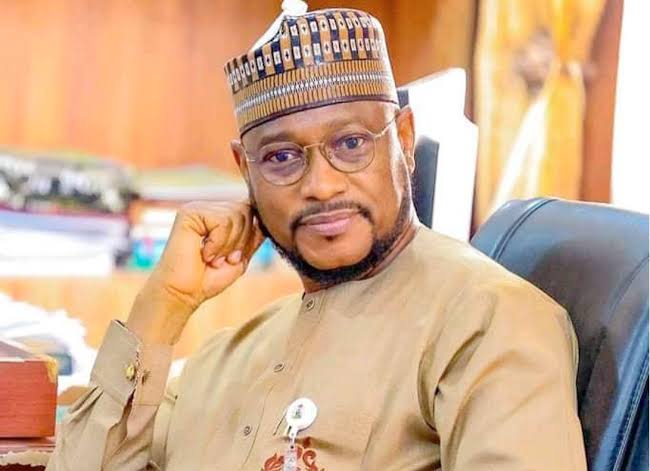Zamfara State Governor, Dauda Lawal, is under mounting pressure to resign following the circulation of a viral video in which he admitted to knowing the locations of bandits terrorising the state but claimed helplessness in tackling them.
The undated clip, in which the governor spoke in Hausa, has stirred outrage across political and security circles. In it, Lawal lamented that despite procuring 150 vehicles for security agencies in Zamfara, he had no control over their deployment since directives must come from Abuja. He further claimed he could track the daily movements of bandits using devices at his disposal and insisted the crisis would end in two months if he had direct authority over security operatives.
“I swear to God wherever bandits are, we know. I know, I can show you on this phone wherever they are… I know, but we can do nothing,” the governor said. “If I am the one in power to give the directives, I swear this issue will come to an end in two months.”
The remarks have been described as both reckless and self-indicting, particularly as Lawal has already received billions of naira in monthly security votes since assuming office almost three years ago. Critics argue that a governor with such financial resources and constitutional powers cannot turn around to claim helplessness in the face of the bloodshed in Zamfara.
A top government official who spoke to this newspaper in Abuja on condition of anonymity said the governor’s statement had shaken confidence at the highest levels of government.
“This is not just irresponsible; it is a slap in the face of Nigerians, especially the security forces. Here is a governor who has received billions in security votes, funds meant precisely for gathering intelligence and supporting operations, yet he goes on video to confess he is helpless. It is unacceptable,” the official said.
The source added that Lawal’s admission of knowing the bandits’ locations but failing to officially transmit such intelligence to the National Security Adviser (NSA), Department of State Services (DSS), or the military was deeply troubling.
“If indeed the governor knows where these criminals are and has withheld such information, then he bears responsibility for every life lost in Zamfara. He cannot collect security votes, enjoy a heavily armed convoy, and then tell villagers that he knows where their killers are but can do nothing,” the official stressed.
Zamfara remains the epicentre of banditry in Nigeria, with rural communities suffering weekly raids. On August 23, gunmen stormed Gamdum Mallam and Ruwan Rana villages in Bukkuyum Local Government Area, killing two people and abducting over 100. Earlier in the month, assailants invaded Kauran Namoda, leaving 24 dead, 16 injured, and 144 kidnapped.
Residents already traumatised by such atrocities say the governor’s video remarks have poured salt on their wounds. “If he truly knows where the bandits are and refuses to act, then he is not fit to lead us. We are left at the mercy of killers,” said a community leader in Maru, who pleaded anonymity.
Security experts have warned that the governor’s comments could embolden bandits and erode citizens’ confidence in state institutions. Dr. Usman Shehu, a Kaduna-based researcher on violent conflicts, described the remarks as “reckless at best and complicit at worst”.
“When a governor admits he knows the location of criminals but insists he is powerless, he undermines both the constitution and the morale of security operatives. It leaves ordinary citizens exposed and erodes the very essence of governance,” Shehu said.
The top government official disclosed that conversations were underway about whether President Bola Tinubu should consider declaring a state of emergency in Zamfara.
“The state is bleeding daily. Villages are being burnt, children abducted, and yet the chief security officer admits helplessness after pocketing billions in security votes. With this level of compromise, a state of emergency may be the only rational option,” the source argued.
The official also criticised the governor’s lavish personal security compared to the vulnerability of ordinary citizens.
“Everywhere he goes, his convoy bristles with armed escorts, including civil defence operatives and armoured vehicles. Meanwhile, ordinary people in Tsafe, Bukkuyum, and Kauran Namoda are slaughtered in their homes. That is the hypocrisy that has enraged Nigerians,” the source said.
The viral video has also unsettled Zamfara’s political class. Some lawmakers are said to be consulting their colleagues in Abuja on demanding a probe into the governor’s handling of security votes and intelligence-sharing obligations.
As the storm gathers, Lawal has yet to issue a formal response to the controversy. His media team has ignored repeated requests for comment.
For many in Zamfara, the pressing question is not whether the governor can redeem himself, but whether the federal government has the political will to intervene before the violence spirals further out of control.
Whether through resignation, a formal probe, or a declaration of emergency, Governor Dauda Lawal now finds himself in the eye of a storm of his own making — one fuelled by his own words.

